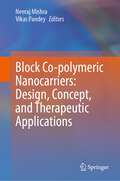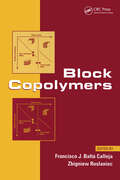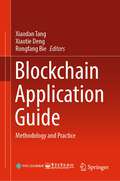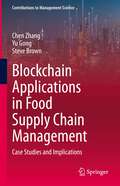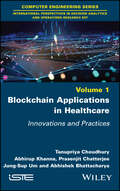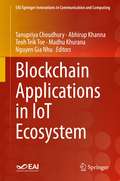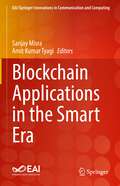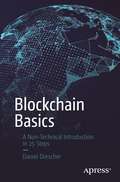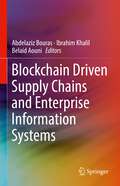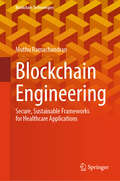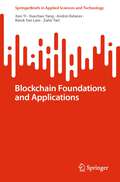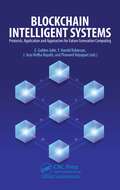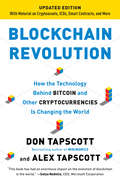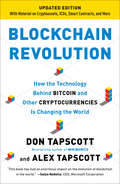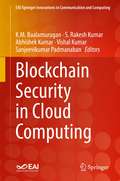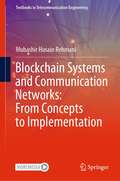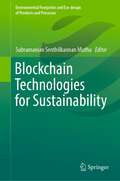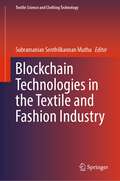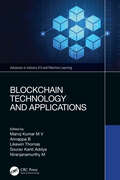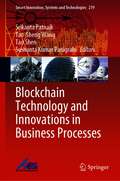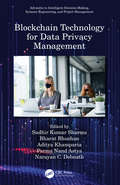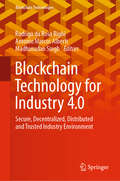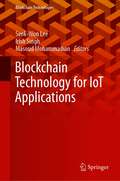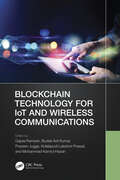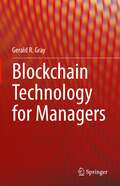- Table View
- List View
Block Co-polymeric Nanocarriers: Design, Concept, and Therapeutic Applications
by Neeraj Mishra Vikas PandeyThis book focuses on current advancements in the field of block copolymers and covers design, concept, and various therapeutic applications in the drug delivery. It also reviews the use of block copolymers in drug delivery applications from the development of sustained release products to smart polymeric delivery systems such as stimuli-responsive polymeric systems, for example, thermosensitive, redox-sensitive, photo-sensitive, and enzyme-sensitive. The book further discusses the nano assemblies from amphiphilic block copolymers as nanomedicine platforms for diagnosis and therapy due to their relatively small size, high drug loading capacity, controlled drug release, in vivo stability, and prolonged blood circulation. The chapters also review the various patents and ongoing clinical trials on the applications, covering several important new concepts and findings in the field of block copolymers. The book is aimed at researchers, academicians, and industrial scientists involved in the development of drug-delivery systems based on polymers.
Block Copolymers
by Francisco J. Baltá Calleja Zbigniew RoslaniecA summary of block copolymer chemical structures and synthesis. It discusses physical methods of characterization such as computer simulation, microhardness, dielectric spectroscopy, thermal mechanical relaxation, ultrasonic characterization, transmission electron microscopy, X-ray scattering, and NMR, among others. It also outlines rheological and
Blockchain Application Guide: Methodology and Practice
by Xiaotie Deng Xiaodan Tang Rongfang BieThis book focuses on progress, concerns and approaches of blockchain application. It summarizes basic concepts, principles and standardization of blockchain technology, as well as the status of blockchain application and industry. It provides an ecology model and an evaluation method for blockchain applications and analyses the governance of blockchain applications. It presents application values and practices in financial services, logistics, government service, culture and education, and people’s livelihood and includes analysis of scenarios and use cases. This book is a summary of the experience of more than 20 experts from enterprises and institutions active in the blockchain industry. It provides a panorama of blockchain applications for users, technology and service providers, application developers and operators and supervisors.
Blockchain Applications in Food Supply Chain Management: Case Studies and Implications (Contributions to Management Science)
by Steve Brown Chen Zhang Yu GongThis book contributes to blockchain applications in food supply chain management from both theoretical and practical perspectives. By using the case study research method, it empirically investigates why and how food companies implement blockchain technology. Moreover, it proposes a conceptual framework based on the case findings and extant literature. The book provides empirical evidence to verify academic findings such as critical success factors and barriers. Furthermore, it identifies the implementation process to answer the ‘how’ question. Uniquely, it applies the innovation process model and the practice-based view (PBV) to studies on food supply chains and blockchain. Thus, building on the original model and theory, it enriches the theory on blockchain implementation, making it a valuable asset for all researchers and practitioners interested in blockchain adoption and food supply chain management.
Blockchain Applications in Healthcare: Innovations and Practices
by Tanupriya ChoudhuryBlockchain is new-age technology used to track every transaction using cryptocurrency across servers linked in a peer-to-peer network, enabling transactions to be secure, transparent and reliable. Retaining an efficient, secure and patient-centric healthcare industry has never been so important, especially due to the damaging effects of the Covid-19 pandemic. The applicability of Blockchain in the healthcare domain can be seen as a remarkable opportunity for researchers and scientists to solve real-world problems. This book focuses on the fundamentals of Blockchain technology along with the methods of its integration with the healthcare industry. It also provides an enhanced understanding of Blockchain technology, AI and IoT across the various application areas of the healthcare industry. Furthermore, throughout the book, areas of relevant applications, such as patient data privacy protection, pharmaceutical supply chains and genomics are discussed.
Blockchain Applications in IoT Ecosystem (EAI/Springer Innovations in Communication and Computing)
by Nguyen Gia Nhu Tanupriya Choudhury Abhirup Khanna Teoh Teik Toe Madhu KhuranaThis book focuses on the fundamentals of blockchain technology along with the means and methods of its integration with Internet of Things (IoT). The book allows the reader to have a deeper understanding of blockchain technology, IoT and various application areas wherein both technologies can be implemented. The book serves the purpose of providing knowledge about the fundamentals of blockchain and IoT to a common reader along with allowing a research scholar to identify some futuristic problem areas that emerge from the convergence of both technologies. Furthermore, the authors discuss relevant application areas such as smart city, e-healthcare, smart travel, etc. throughout the course of the book. The book also talks through a few case studies illustrating the implementation and benefits of using blockchain and IoT. Provides a comprehensive view of blockchain technology and its integration with IoT;Facilitates in having a valuable understanding of various application areas pertaining to blockchain and IoT;Assists the reader in exploring new research areas wherein blockchain and IoT can find their applicability based upon their list of benefits.
Blockchain Applications in the Smart Era (EAI/Springer Innovations in Communication and Computing)
by Sanjay Misra Amit Kumar TyagiThis book covers a variety of topics and trends related to blockchain technology for smart era applications. The applications span industries such as health, government, energy management, manufacturing, finance, information systems, all far beyond blockchain's original use in cryptocurrency. The authors present variants, new models, practical solutions, and technological advances related to blockchain in these fields and more. The applications within these fields include blockchain and cyber-security, IoT security and privacy using blockchain, and blockchain in industries and society . A variety of case studies are also included. The book is applicable to researchers, professionals, students, and professors in a variety of fields in communications engineering.
Blockchain Basics: A Non-Technical Introduction in 25 Steps
by Daniel DrescherIn 25 concise steps, you will learn the basics of blockchain technology. No mathematical formulas, program code, or computer science jargon are used. No previous knowledge in computer science, mathematics, programming, or cryptography is required. Terminology is explained through pictures, analogies, and metaphors. This book bridges the gap that exists between purely technical books about the blockchain and purely business-focused books. It does so by explaining both the technical concepts that make up the blockchain and their role in business-relevant applications. What You Will Learn: What the blockchain is Why it is needed and what problem it solves Why there is so much excitement about the blockchain and its potential Major components and their purpose How various components of the blockchain work and interact Limitations, why they exist, and what has been done to overcome them Major application scenarios Who This Book Is For: Everyone who wants to get a general idea of what blockchain technology is, how it works, and how it will potentially change the financial system as we know it
Blockchain Driven Supply Chains and Enterprise Information Systems
by Abdelaziz Bouras Ibrahim Khalil Belaid AouniBlockchain Driven Supply Chains and Enterprise Information Systems examines initiatives for blockchain implementation in supply chain management and the integration of blockchain technology with existing enterprise management applications. The authors aim to establish common ground to provide solutions and best practices in the supply chain field, while tackling the challenges faced when integrating blockchain in supply chain policy. Chapters address both design and implementation aspects of supply chain platforms and enterprise information systems, and provide real-world use cases and examples from industry that address the impacts of using blockchain in the modern supply chain.
Blockchain Engineering: Secure, Sustainable Frameworks for Healthcare Applications (Blockchain Technologies)
by Muthu RamachandranThis book provides a comprehensive guide to the principles and engineering approaches necessary for developing secure and sustainable blockchain applications. It introduces fundamental blockchain concepts and explores the integration of AI and blockchain. Targeted at students, IT professionals, managers, and healthcare practitioners, this book seeks to empower readers to effectively leverage blockchain technology.
Blockchain Foundations and Applications (SpringerBriefs in Applied Sciences and Technology)
by Xun Yi Zahir Tari Kwok Yan Lam Xuechao Yang Andrei KelarevThis monograph provides a comprehensive and rigorous exposition of the basic concepts and most important modern research results concerning blockchain and its applications. The book includes the required cryptographic fundamentals underpinning the blockchain technology, since understanding of the concepts of cryptography involved in the design of blockchain is necessary for mastering the security guarantees furnished by blockchain. It also contains an introduction to cryptographic primitives, and separate chapters on bitcoin, ethereum and smart contracts, public blockchain, private blockchain, cryptocurrencies, and blockchain applications.This volume is of great interest to active researchers who are keen to develop novel applications of blockchain in the field of their investigatio. Further, it is also beneficial for industry practitioners as well as undergraduate students in computing and information technology.
Blockchain Intelligent Systems: Protocols, Application and Approaches for Future Generation Computing
by E. Golden Julie Y. Harold Robinson J. Jesu Vedha Nayahi Thavavel VaiyapuriBlockchain provides an environment where technologies converge to provide numerous benefits. However, there are still many problems ahead, and changes are required at all levels - technology, algorithms, and human-computer interaction for widespread acceptance of blockchain intelligence systems. This book reviews blockchain technology and the current developments in research and business applications. It explores the real-time applications and issues that will bring the synergy needed to materialize the goal of blockchain intelligence. Researchers in various fields such as Blockchain, Data Analysis, IoT, Data Science, Crypto currencies will find this book useful. Students and professionals working on Blockchain in artificial intelligence, IoT, Healthcare, Robotics, Soft computing, and Data science will also benefit from this. It offers a realistic and thorough introduction that supports programmers, students and researchers in other disciplines. The book comprises chapters dealing with various issues, to provide readers with greater readability, versatility and adaptability.
Blockchain Revolution: How the Technology Behind Bitcoin Is Changing Money, Business, and the World
by Don Tapscott Alex TapscottThe technology likely to have the greatest impact on the future of the world economy has arrived, and it’s not self-driving cars, solar energy, or artificial intelligence. It’s called the blockchain. The first generation of the digital revolution brought us the Internet of information. The second generation—powered by blockchain technology—is bringing us the Internet of value: a new, distributed platform that can help us reshape the world of business and transform the old order of human affairs for the better. Blockchain is the ingeniously simple, revolutionary protocol that allows transactions to be simultaneously anonymous and secure by maintaining a tamperproof public ledger of value. Though it’s the technology that drives bitcoin and other digital currencies, the underlying framework has the potential to go far beyond these and record virtually everything of value to humankind, from birth and death certificates to insurance claims and even votes. Why should you care? Maybe you’re a music lover who wants artists to make a living off their art. Or a consumer who wants to know where that hamburger meat really came from. Perhaps you’re an immigrant who’s sick of paying big fees to send money home to loved ones. Or an entrepreneur looking for a new platform to build a business. And those examples are barely the tip of the iceberg. This technology is public, encrypted, and readily available for anyone to use. It’s already seeing widespread adoption in a number of areas. For example, forty-two (and counting) of the world’s biggest financial institutions, including Goldman Sachs, JPMorgan Chase, and Credit Suisse, have formed a consortium to investigate the blockchain for speedier and more secure transactions. As with major paradigm shifts that preceded it, the blockchain will create winners and losers. And while opportunities abound, the risks of disruption and dislocation must not be ignored.Don Tapscott, the bestselling author of Wikinomics, and his son, blockchain expert Alex Tapscott, bring us a brilliantly researched, highly readable, and utterly foundational book about the future of the modern economy. Blockchain Revolutionis the business leaders’ playbook for the next decade and beyond.
Blockchain Revolution: How the Technology Behind Bitcoin is Changing Money, Business, and the World
by Don Tapscott Alex Tapscott<p>Blockchain technology is powering our future. As the technology behind cryptocurrencies like bitcoin, open software platforms like Ethereum, and disruptive companies like Ripple, it’s too important to ignore. <p>In this revelatory book, Don Tapscott, the bestselling author of Wikinomics, and his son, blockchain expert Alex Tapscott, bring us a brilliantly researched, highly readable, and essential book about the technology driving the future of the economy. <p>Blockchain is the ingeniously simple, revolutionary protocol that allows transactions to be simultaneously anonymous and secure by maintaining a tamperproof public ledger of value. Though it’s best known as the technology that drives bitcoin and other digital currencies, it also has the potential to go far beyond currency, to record virtually everything of value to humankind, from birth and death certificates to insurance claims, land titles, and even votes. <p>Blockchain is also essential to understand if you’re an artist who wants to make a living off your art, a consumer who wants to know where that hamburger meat really came from, an immigrant who’s tired of paying big fees to send money home to your loved ones, or an entrepreneur looking for a new platform to build a business. And those examples are barely the tip of the iceberg. <p>As with major paradigm shifts that preceded it, blockchain technology will create winners and losers. This book shines a light on where it can lead us in the next decade and beyond.</p>
Blockchain Security in Cloud Computing (EAI/Springer Innovations in Communication and Computing)
by Abhishek Kumar Sanjeevikumar Padmanaban S. Rakesh Kumar K. M. Baalamurugan Vishal KumarThis book explores the concepts and techniques of cloud security using blockchain. Also discussed is the possibility of applying blockchain to provide security in various domains. The authors discuss how blockchain holds the potential to significantly increase data privacy and security while boosting accuracy and integrity in cloud data. The specific highlight of this book is focused on the application of integrated technologies in enhancing cloud security models, use cases, and its challenges. The contributors, both from academia and industry, present their technical evaluation and comparison with existing technologies. This book pertains to IT professionals, researchers, and academicians towards fourth revolution technologies.
Blockchain Systems and Communication Networks: From Concepts to Implementation (Textbooks in Telecommunication Engineering)
by Mubashir Husain RehmaniThis book provides extensive insights on blockchain systems, starting from a historical perspective and moving towards building foundational knowledge, with focus on communication networks. It covers blockchain applications, algorithms, architectures, design and implementation, and security and privacy issues, providing the reader with a comprehensive overview. Further, it discusses blockchain systems and its integration to communication networks. The book includes hands-on, practical tutorials, self-assessment exercises, and review questions; tips and sample programs are also provided throughout. Complementary supporting material for instructors, including open source programming code for practical tutorials and exercises, is also available. The target audience includes graduate students, professionals, and researchers working in the areas of blockchain systems, distributed ledger technology, computer networks and communications, artificial intelligence, and cybersecurity.
Blockchain Technologies for Sustainability (Environmental Footprints and Eco-design of Products and Processes)
by Subramanian Senthilkannan MuthuThis book highlights the applications of blockchain technologies to foster sustainable development in different fields. The concept of Sustainability has grown widespread in today’s context and there are many requirements to achieve Sustainability in any industrial sector including mapping, tracing the supply chain to ensure sustainable supply chain management. Reliable and transparent, efficient data is one of the key requirements for Sustainability in today’s advanced industrial context. Achievement of Sustainability objectives in this advanced era demands various technological advancements such as Blockchain technologies. The core competencies of blockchain technology namely transparency, data auditability, privacy, value transfer, and process efficiency and automation are very much essential for achieving the multifold objectives under sustainability.
Blockchain Technologies in the Textile and Fashion Industry (Textile Science and Clothing Technology)
by Subramanian Senthilkannan MuthuThis book presents applications of blockchain technologies to foster sustainable development in the textile and clothing supply chain. The concept of Textiles and Fashion Sustainability has grown to a wider extent today. Among the list of items to achieve Sustainability in Textiles and Fashion, the key element is the traceability of supply chains in terms of mapping and tracing the entire supply chain to ensure sustainable supply chain management. Reliable and transparent, efficient data is one of the crucial requirements for Textiles and Fashion Sustainability in today’s advanced industrial context and this is possible in this advanced era by various technological advancements such as Block chain technologies. These days one can see a widespread application of blockchain technology in the Textiles and Clothing sector. The core competencies of blockchain technology namely transparency, data auditability, privacy, value transfer, and process efficiency and automation are very much essential for achieving the multifold objectives under the theme Textiles and Fashion Sustainability.
Blockchain Technology and Applications (Advances in Industry 4.0 and Machine Learning)
by Sourav Kanti Addya Annappa B Likewin Thomas Niranjanamurthy M M V, Manoj KumarBlockchain is an emerging platform for developing decentralized applications and data storage, over and beyond its role as a platform for cryptocurrencies. This reference text provides a comprehensive discussion on blockchain technology from research and application perspective. Discusses different approaches for building distributed applications (DAPPS). Provides detailed listing and discussion of blockchain technology applications in solving real life problems. Covers proof of work (PoW) based blockchain consensus, and proof of stake (PoS) based blockchain consensus. Discusses blockchain algorithms including practical byzantine fault tolerance (PBFT) and simplified byzantine fault tolerance (SBFT). It comprehensively covers important topics including blockchain consensus algorithms, Ethereum, Hyperledger, blockchain scalability, smart contracts with solidity, ERC20 standards, building DApp with Golang, building DApp using Hyperledger, building PoCs with Hyperledger fabric, blockchain as a server, blockchain security and privacy. The text will serve as a useful text for senior undergraduate and graduate students in interdisciplinary areas including electronics and communications engineering, electrical engineering, computer science, and information technology.
Blockchain Technology and Innovations in Business Processes (Smart Innovation, Systems and Technologies #219)
by Srikanta Patnaik Tao-Sheng Wang Tao Shen Sushanta Kumar PanigrahiThis edited book provides a platform to bring together researchers, academia and industry collaborators to exchange their knowledge and work to develop better understanding about the scope of blockchain technology in business management applications of different sectors such as retail sector, supply chain and logistics, healthcare sector, manufacturing sector, judiciary, finance and government sector in terms of data quality and timeliness. The book presents original unpublished research papers on blockchain technology and business management on novel architectures, prototypes and case studies.
Blockchain Technology for Data Privacy Management (Advances in Intelligent Decision-Making, Systems Engineering, and Project Management)
by Bharat Bhushan Narayan C. Debnath Sudhir Kumar Sharma Aditya Khamparia Parma Nand AstyaThe book aims to showcase the basics of both IoT and Blockchain for beginners as well as their integration and challenge discussions for existing practitioner. It aims to develop understanding of the role of blockchain in fostering security. The objective of this book is to initiate conversations among technologists, engineers, scientists, and clinicians to synergize their efforts in producing low-cost, high-performance, highly efficient, deployable IoT systems. It presents a stepwise discussion, exhaustive literature survey, rigorous experimental analysis and discussions to demonstrate the usage of blockchain technology for securing communications. The book evaluates, investigate, analyze and outline a set of security challenges that needs to be addressed in the near future. The book is designed to be the first reference choice at research and development centers, academic institutions, university libraries and any institutions interested in exploring blockchain. UG/PG students, PhD Scholars of this fields, industry technologists, young entrepreneurs and researchers working in the field of blockchain technology are the primary audience of this book.
Blockchain Technology for Industry 4.0: Secure, Decentralized, Distributed and Trusted Industry Environment (Blockchain Technologies)
by Madhusudan Singh Rodrigo da Rosa Righi Antonio Marcos AlbertiThis book explores recent advances in blockchain technology and its impact on Industry 4.0 via advanced technologies. It provides an in-depth analysis of the step by step evolution of Industry 4.0 and blockchain technologies for creating the next-generation, secure, decentralized, distributed and trusted industry environment and enhancing the productivity of industries. The book describes how blockchain technology makes the industrial internet (Industry 4.0) a transparent, reliable and secure environment for people, processes, systems, and services, presenting a strong, technological and conceptual framework and roadmap for decision-makers involved in the transformation of any area of industry.
Blockchain Technology for IoT Applications (Blockchain Technologies)
by Seok-Won Lee Masoud Mohammadian Irish SinghThis book explores recent advances in the Internet of things (IoT) via advanced technologies and provides an overview of most aspects which are relevant for advance secure, distributed, decentralized blockchain technology in the Internet of things, their applications, and industry IoT. The book provides an in-depth analysis of the step-by-step evolution of IoT to create a change by enhancing the productivity of industries. It introduces how connected things, data, and their communication (data sharing) environment build a transparent, reliable, secure environment for people, processes, systems, and services with the help of blockchain technology.
Blockchain Technology for IoT and Wireless Communications
by Budati Anil Kumar Gajula Ramesh Praveen Jugge Kolalapudi Lakshmi Prasad Mohammad Kamrul HasanSmart communications are the concept in which smart appliances and devices are integrated into an application that runs in a smart hand-held device. The residents of a smart home can have complete control over their home’s electronic gadgets using wireless communications. These technologies can help people control gadgets in the home/office remotely and often simultaneously, which increases convenience and reduces time spent on these tasks. However, problems can arise in the security systems associated with these smart devices; security may be compromised when there are loopholes or human mistakes. When security credentials are lost, overall security can also be lost. This is because smart technology is made up of plenty of devices that are integrated with Internet of Things (IoT) technology and the cloud. This environment can introduce many security issues, as discussed in this text. Blockchain is a promising technology that operates in a decentralized environment to protect devices and the data collected by devices from security and privacy issues by using wireless communication technology. Blockchain-enabled IoT can be used to achieve end-to-end security. Blockchain technology is already used in wireless sensor/communication networks to estimate and predict house data and civil structures. IoT-integrated innovative applications like smart homes present unique security and privacy challenges. Scalability is the main problem as the current centralized IoT platforms have message routing mechanisms that create a bottleneck in scaling up too many devices used in IoT. As many devices are participating in generating data, such a setup may also be subjected to Distributed Denial of Service (DDoS) attacks. Lack of data standards is another cause of concern as it leads to interoperability problems. Blockchain technology for IoT and wireless communications offers a promising solution for smart devices. These technologies can provide end-to-end security and overcome the aforementioned problems. The usage of open-standard distributed IoT solutions can solve many problems that are associated with centralized approaches. Blockchain technology is nothing but a distributed ledger of transactions. It offers direct communication to connected devices. Such devices collect data, and all legitimate participants can access said data. Thus, decentralized blockchain networks can provide improved security for IoT-based solutions.
Blockchain Technology for Managers
by Gerald R. GrayBlockchain is a technology that tends to be misunderstood by managers that need to make technology acquisition decisions. This book will provide readers with a basic understanding of blockchain and distributed ledger technology (DLT), the technologies that underpin it, and the technologies DLT is built upon. The book is purposefully not a book on how to code or explore other technical aspects of blockchain (other than the fundamentals). Rather, it provides managers with the basic understanding of the architectures and consensus algorithms, how they work, the design trade-offs of each architecture type, and what problems and use cases the core characteristics of DLT are best suited to solve ─ providing business managers with the core information they need to ask the right questions of vendors when making business value assessments and acquisition decisions.
